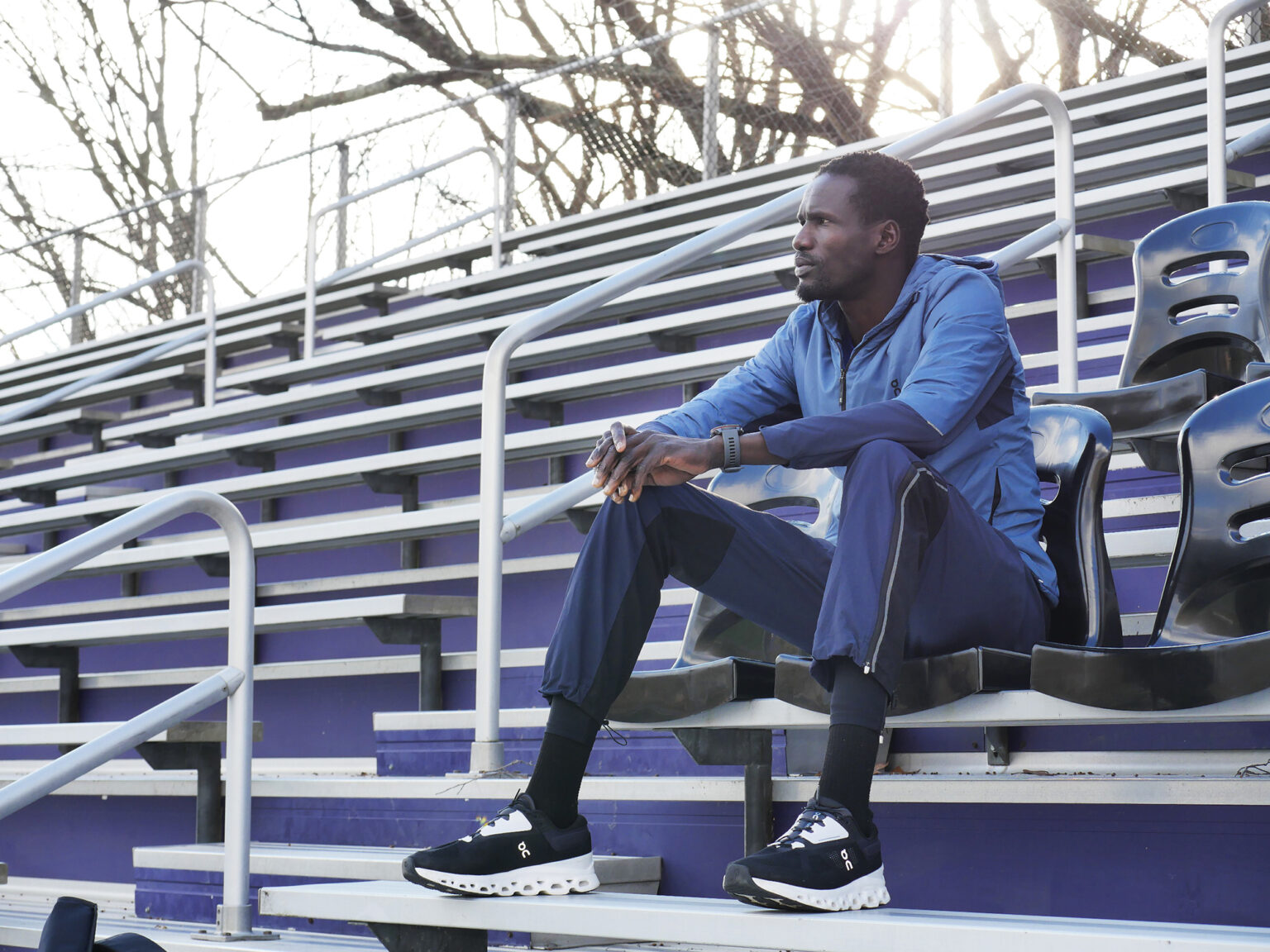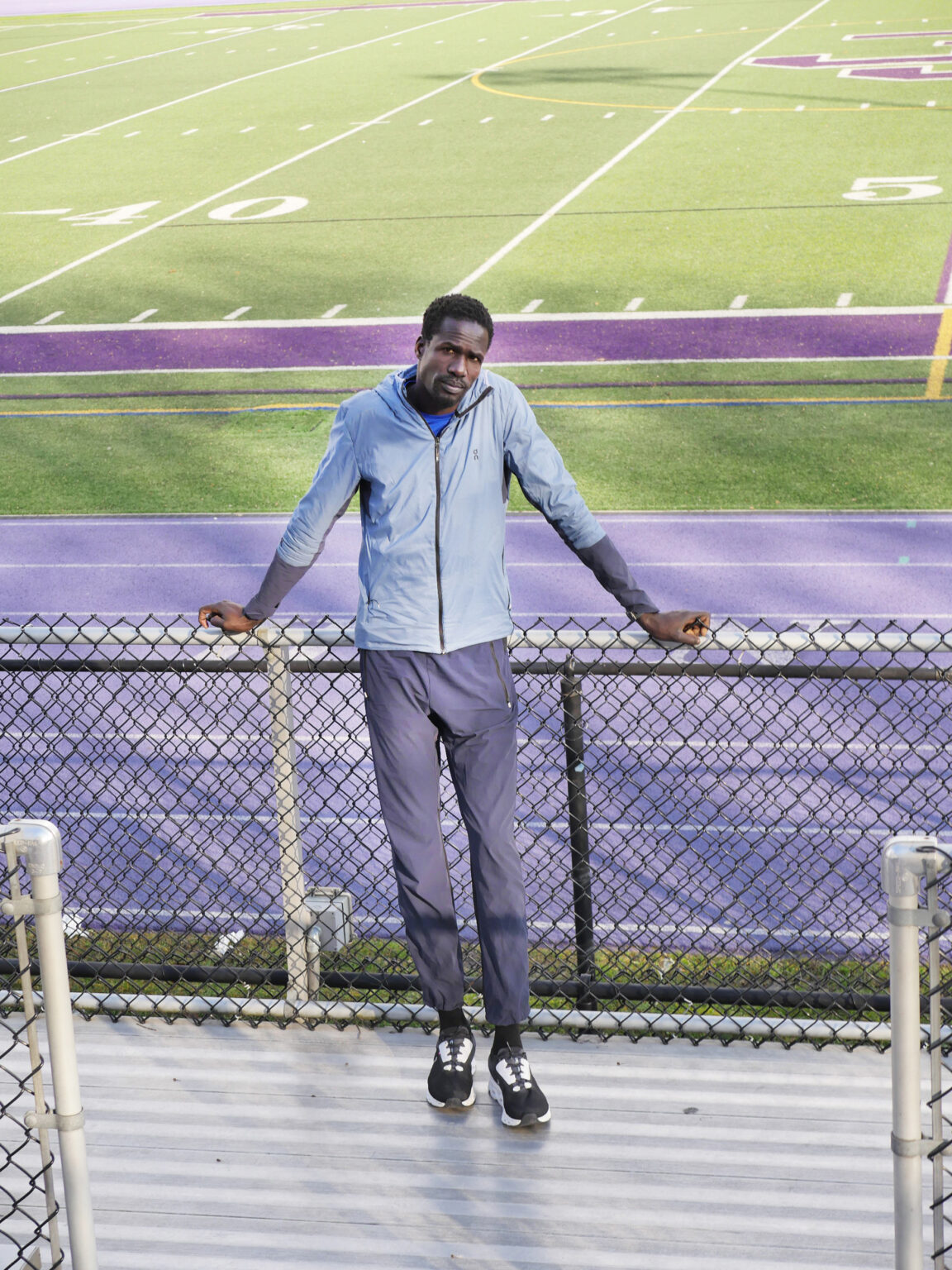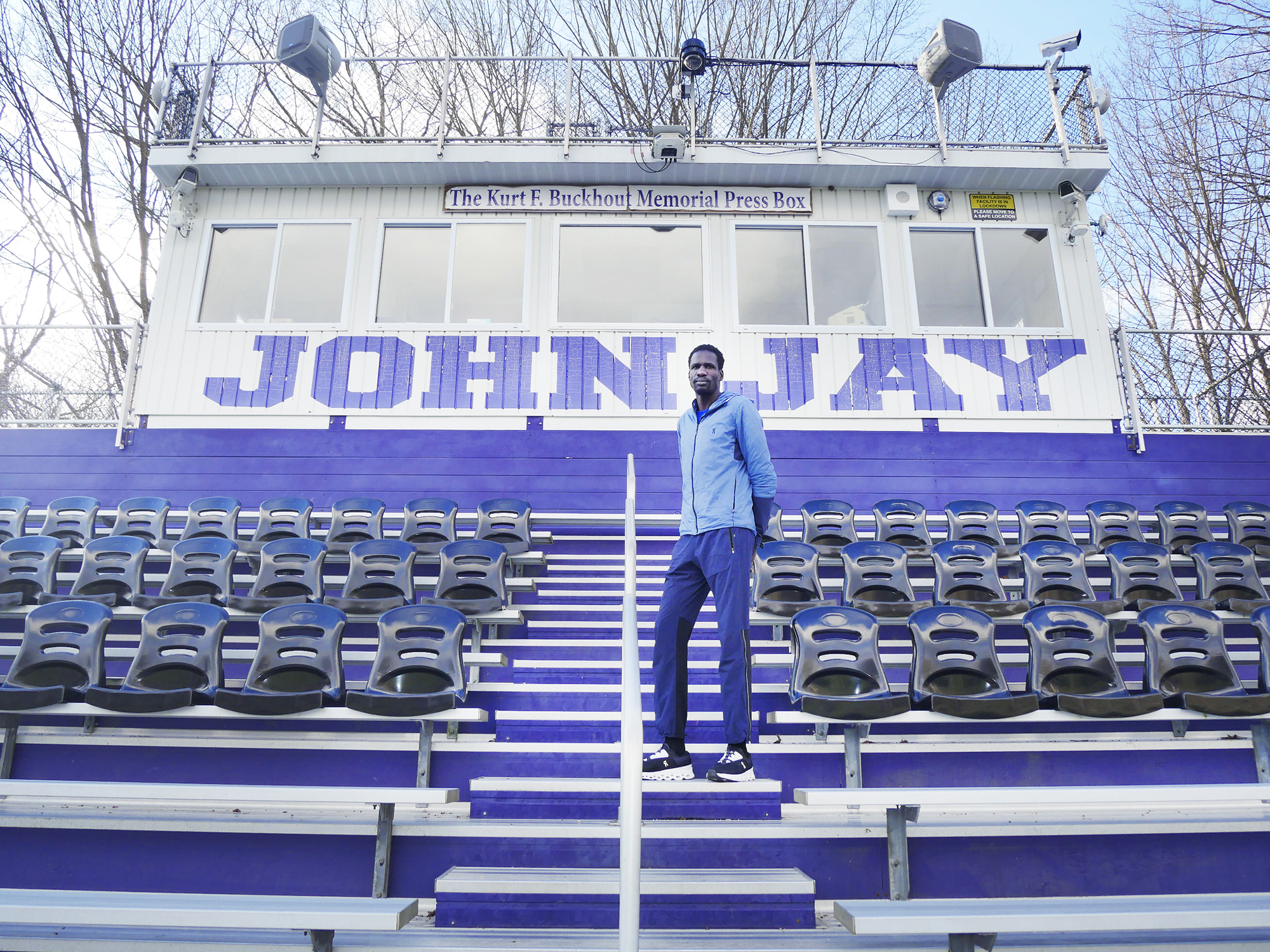Writing by Gia Miller
Photography by Justin Negard
Author’s note: Beginning in 1987, the Sudanese civil war caused an estimated 20,000 young boys to flee their homes in southern Sudan and leave their families behind. Most of these boys were only six or seven years old; they fled to escape death or capture—the former being a horrific thought and the latter (which would result in joining the northern army), a similarly terrifying prospect. The boys walked over 1,000 miles to a refugee camp in Ethiopia; many died along the way. They became known as the Lost Boys of Sudan—one of those boys, named Dey Dey, recently became the new John Jay High School varsity women’s track coach. Here is his story.
It takes an adult less than one month to walk to Ethiopia, but because we were young, it took us three months,” says John Jay High School varsity women’s track coach Dey Dey, who asked to meet on the track so he could share his story. “We would walk for maybe five hours a day before we stopped. At night, we’d make a fire and sleep on the grass around it. It was hard. I missed my mom, dad, brothers and sisters. But I was so young, and there was nothing I could do.”
In 1995, when Dey was only seven years old, he made the long trek from southern Sudan to Ethiopia. Prior to the journey, he spent his days in the fields, playing with other children and caring for the cows. Dey says he had “seven or eight brothers and sisters,” and they all lived together, with their parents, in a one-room, grass home. They were members of the second largest tribe in the region, and it was a “two- or three-day walk” to Malakal, the closest city. Then one day, everything changed.
“My uncle came to talk to my mom and dad; he wanted to take me to a refugee camp in Ethiopia,” Dey says. “My mom didn’t like that idea, so that night, my uncle took me to stay in his home. But that night, the problem came, so we ran away—a different way than my parents. Three days later, I learned that my village was attacked.”
Dey escaped just in time. He fled with his uncle, aunt, their “one- or two-year-old daughter” and about 30 other adults and children.
“It was a big group,” he remembers. “Some of them came with their family, and some were alone because their family ran another way.”
Dey’s uncle was a hunter who knew how to survive in the jungle as well as the path to Ethiopia. But the journey was still very difficult, especially in the beginning.
“I remember the second day of walking—we were so hungry, and there was nothing to eat,” he says. “My uncle and the other grown people tried to find a way to get us some food. They put all of us young kids under a tree, and they went to hunt. They came home with one gazelle. As they were cutting, they gave us some of the blood to drink. It was my first time drinking blood, but I was so hungry. Then they built a big fire and roasted the meat.”
For the rest of the journey, they ate just two times a day: morning and night.
“Not everyone made it to Ethiopia,” Dey explains. “We had to cross the Nile river, and a lot of us were young. I know two of [the children] my age didn’t make it; they drowned. My uncle and the others tried to look for them but couldn’t find them. One older guy was caught by crocodiles, and they took him.”
The Dimma Refugee Camp
Three months after leaving their homes, the group arrived at the border of southern Sudan and Ethiopia. It was like entering a different world.
“I saw [electric] lights for the first time, and they have cars—I had never seen a car before,” Dey remembers. “It was crazy. I saw something that was running, and I didn’t even know what it was. When we got to Gambella, my uncle told me he is taking us to a refugee camp, which was another day of being on the bus.”
“The bus ride was scary,” he continues. “The road was bumpy, and we were driving on the tip of a mountain. So, I was looking down and seeing the same road we were just on. That same day, a bus before [ours] fell all the way down. It was scary, very scary.”
The morning Dey and the others arrived at Dimma Refugee Camp, they went straight to the United Nations office. They waited in line for three hours before they were told they should stay in a tent overnight and come back the next day. They arrived early the next morning and waited again; that evening, they received ration cards, which allowed them to get food.
Two weeks later, the U.N. moved Dey into a tent with six other boys his age. He lived with these boys for the remainder of his time in Ethiopia. Every Tuesday and Thursday, U.N. workers arrived and gave the boys treats, but their main meals were cooked by a chef at the camp. Three or four months later, Dey went to school for the very first time and began to learn a little bit of English and math.
“The camp was run by refugees, and some of them were from South Sudan,” he explains. “But they’d been in Ethiopia for so long and went to school in Ethiopia, so they could teach us. We sat outside, but it was still a little bit weird because we didn’t really know what school was. The only thing we knew was how to play.”
Several years later, in 2001, one of his cousins was part of a group from Kakuma Refugee Camp that was moved to Dimma. He’d never met this cousin before, but his uncle introduced them, and they saw each other “every once in a while” for a few years. Eventually, this cousin moved to Minnesota.
“After a few years, those U.N. workers who came to the camp every Tuesday and Thursday asked me if I wanted to come to the U.S.,” he remembers. “But because I was so young, I wasn’t that into it. They asked me every week, and three years later, in 2005, I began to think it might be a good idea.”
Dey and two other boys from his tent all accepted the offer at the same time, and they spent the next year going through the steps to relocate to the U.S.
“They asked me a lot of questions,” he says. “One time, they said, ‘We want you to come to America. But if you go there, would you be like those black people in America?’ But I didn’t know anything [about what they meant]. I had dreadlocks. So they thought that I might become a bad person. And they made me actually get my hair cut.”
“They didn’t do the appointments in the refugee camp,” he continues. “So, they brought us all the way to the capital city, Addis Ababa, which is another two days on the bus, and the three of us stayed in a building together for a year. We went to the office about three times a week, and the rest of the time, we just relaxed.”
In time, the other two boys were sent to America, and Dey was left behind. There was no explanation given, but four months later, it was Dey’s turn.

Traveling to America
Dey was one of about 3,600 Sudanese refugees who resettled in the United States. When he left Ethiopia, he wore “a good trouser, a good shirt and a good shoe,” and he brought nothing else.
“I remember going to the airport for the first time in Ethiopia and seeing an escalator,” he says. “It was crazy! Now, seeing the inside of an airplane, which I had never seen before, wow!”
There were two families of refugees on the plane. One was a family of seven, and the other, a family of five. The plane landed in Amsterdam, and they waited a few hours before boarding another plane to New Jersey. When they arrived at their hotel near the Newark airport, Dey had his first taste of American pop culture.
“When I got to my hotel room, they turned on the TV, and there was a cartoon on TV—it was the first time I’d seen a cartoon,” he remembers. “I had seen a TV in Ethiopia because we would go watch football, but I didn’t really know how it worked. So, the TV was on, and it was a movie called ‘Shrek,’ and it was the first time I’d seen a donkey talking! I didn’t sleep all night long because it was on, and I didn’t know how to turn it off. I watched the same movie all night long. I didn’t understand any of it, but it was just fun because a donkey was talking… and that green guy—it was fun!”
The next morning, one of the refugee families left for Texas, the other went to Arizona and Dey boarded a plane for Colorado.
All alone
When Dey arrived in Denver, he was given an apartment to live in, alone.
“I didn’t know about any other refugees; there was only me for a good six months,” he remembers. “I didn’t do anything. I just sat on the couch, and I slept on the couch. They gave me a TV and turned it on to this cartoon called ‘It’s a Big, Big World.’ So, day and night, I’m just watching that show. It helped me learn English.”
“But I didn’t feel good,” Dey continues. “I had come to a town where I didn’t know anybody. My family wasn’t with me. I was alone in that apartment. I was in a different world without anybody. It was tough.”
Dey’s caseworker visited him weekly and brought him microwaveable meals. After a month, she enrolled him in ESL (English as a Second Language) classes, which were given in the same building where she worked. She took him to and from class every day.
One day, six months after his arrival, Dey was walking in the park near his apartment, and he met a man named Peter, who was from his same village in southern Sudan. Peter had arrived in Colorado in 1992, and he became Dey’s very first friend in America.
In 2008, when Dey was 16 years old, his caseworker denied his request to go to high school, advising him that he needed to get a job to remain on food stamps. Peter, who drove a city bus, stepped in to help. He began giving Dey $20 a week to help him purchase food. Later, Peter suggested Dey move in with him so Dey didn’t have to live alone. Peter became the closest thing Dey had to a father.
“The person that I am today is because of him,” Dey says.
Soon, Peter brought his nephews, who had been sent to Syracuse, to live with him and Dey in Denver. Dey began sharing a room with one of the boys, named Koang. Soon after Koang moved in, he and Dey asked Peter if they could attend high school, and Peter enrolled them.
“They tested me and him [Koang],” Dey remembers. “It was math questions, like 10 math questions. I got nine; I missed one. I don’t know how many he got, but they put me in a junior class, and they put him in a freshman class. But my English was still terrible. The principal knew we really wanted to learn English, so from 12:30 to 6 p.m., we learned English. We left our home at 6 a.m., and from 6:30 until 12, we had classes. I learned math, chemistry and other things. Then, we had English.”

Becoming a runner
“The first day that one of the top runners in the state saw me, he thought I was a runner,” Dey remembers. “He went to the coach and told him, ‘I saw a tall African, and he doesn’t know how to run, but he looks like a runner.’ I’d never run before. But the coach and her husband came to talk to me, and they asked me if I could join, so I said okay. Peter bought me shoes; they were Reebok G Unit shoes for basketball. I went to school the next day in those shoes, and I ran a mile.”
Peter attended Dey’s tryout and told Dey to follow his coach, who was riding a bike. The whole team ran, and Dey beat everyone “by a lot.”
“They were doing their training, but for me, I was just chasing the bike,” he says. “Then she started riding fast, and it was great!”
Dey became a middle-distance runner and made it to the state competition his first year. The next year, as a senior, Dey earned a full scholarship to the University of Arkansas for track. He wanted to major in kinesiology and become a coach.
“The one thing you find out when you’re a Division One athlete is that they own you,” he says. “They made me change my major to psychology in my junior year. But that year, I had a stress fracture and couldn’t make it to practice. So, one day, I got a call that they [had] cut my scholarship. So, I didn’t graduate.”
Dey returned to Colorado, but this time, he went to Colorado Springs. While still in Arkansas, a coach called Dey and asked if he would move to Colorado Springs so he could train for the Olympics. When Dey could no longer attend college, he took the coach up on his offer. Dey competed in the U.S. championships that year and came in fifth, missing the cut by two.
“That year, I traveled the whole of America competing, and I won most of my races,” he says.
Dey also spent some time in New York, working as a pacer (a runner who sets the pace for another runner) for the 800-meter world record holder. Then, a Kenyan friend suggested Dey train in Kenya, and Dey agreed it was a good idea. He trained there for three months in 2016.
“It’s hard, hard training,” he says. “The way they train, it’s very hard. When I came back to Colorado, I ran some road races, and then I received a call from Mike Barnow, who coaches the Westchester Track Club. He saw me run in college, and he asked me if I could come to New York to train with him. I said okay, and that’s how I came to New York. I moved all the way to New Paltz because that’s where he [Barnow] lives.”
In November 2017, the coach of the Horace Greeley women’s track team asked Barnow if he could recommend someone for a coaching position. Barnow recommended Dey, and he began immediately, coaching both the girls’ and boys’ teams. It took him some time, but in a few years, the team began to win.
“I coached there until COVID,” Dey says. “That year, one of the guys made it all the way to New York State, and he ended up getting a scholarship to go to Fordham.”
Dey began coaching the women’s varsity track team at John Jay High School this past fall.
Not a Lost Boy
Dey keeps in touch with Peter, who still lives in Denver. And he also speaks to Koang, who now lives and works in Utah. He’s tried to reconnect with his cousin in Minnesota, but it hasn’t worked out.
“The U.S. is not an easy place to be, so everyone’s doing their own thing,” he says. “I’m that person that if I try so hard to keep in touch with you, but you’re not [keeping in touch], then I’ll stop.”
Dey never reconnected with his parents or any of his siblings, and he has no idea if they are still alive. Despite this, Dey doesn’t refer to himself as a Lost Boy of Sudan.
“I don’t like that term,” he says. “Because to me, if you’re lost, then you’re not going to be found. But I get it; it’s a way for people to name the refugees, but it’s not really for me. I didn’t come here as a lost boy. I came here as an unaccompanied minor. That’s what they called me.”
Dey dreams of helping refugees in a camp someday, but for now, he’s working with high school students.
“I would like the kids here to go to Africa and see a refugee camp,” he says. “It would make them say, ‘Thank God I have my family with me.’ Because in my life, I’ve been living on my friends, which I call my family. That’s how I was raised. I grew up with my friends; they are my family. That’s what I’m trying to help the kids here understand. When it’s hard, you just have to work through it.”
This article was published in the March/April 2024 print edition of Connect to Northern Westchester.
Gia Miller is an award-winning journalist and the editor-in-chief/co-publisher of Connect to Northern Westchester. She has a magazine journalism degree (yes, that's a real thing) from the University of Georgia and has written for countless national publications, ranging from SELF to The Washington Post. Gia desperately wishes schools still taught grammar. Also, she wants everyone to know they can delete the word "that" from about 90% of their sentences, and there's no such thing as "first annual." When she's not running her media empire, Gia enjoys spending quality time with friends and family, laughing at her crazy dog and listening to a good podcast. She thanks multiple alarms, fermented grapes and her amazing husband for helping her get through each day. Her love languages are food and humor.











